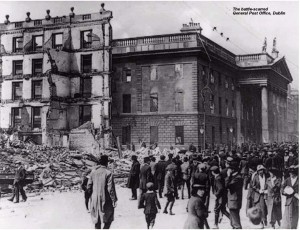
Con Guy Pearce nei panni di James Connolly e Ian Hart in quelli di Thomas Clarke, Hollywood si prepara a portare Padraig Pearse ed i suoi compagni rivoluzionari sul grande schermo.
Ma non tutti sono felici della prospettiva, con un importante storico, il professore di Politica della Queens University, Paul Bew, il quale avverte che il trattamento hollywoodiano del 1916 potrebbe essere sfruttato dai dissidenti repubblicani per opporsi al processo di pace.
Esprimendo la sua paura che il film possa essere troppo semplicistico nella descrizione degli eventi, il professor Bew ha detto: “Spero questo film non faccia risorgere il solito vecchio cliché secondo cui gli inglesi sono colpevoli per quanto fatto agli irlandesi. Le circostanze che avvolgono la Pasqua 1916 sono molto più complicate di quelle”.
Ma Nicola Charles, produttrice di Easter Sixteen, film da 25 miliioni di dollari di budget, ha difeso la sceneggiatura scritta da Brendan Foley, negando che la violenza sia mostrata in maniera romantica.
“E’ un film che doveva essere fatto e Foley ha impiegato 14 anni lavorando sulla trama. Il film è davvero il prequel di Michael Collins. La nostra scena finale è la loro scena di apertura.
“E’ una storia di interesse umano ed in nessun modo glorifica la violenza. Non parla di violenza e rivoluzione ma di speranza ed eroismo”, ha detto la produttrice.
Commentando la raffigurazione degli uomini dietro all’Easter Rising 1916, ha detto che non erano ribelli, “ma gente ordinaria che non voleva lottare per il Re o per l’Imperatore”.
Ha ammesso che “i puristi europei degli avvenimenti” scarteranno completamente il film, ma difende la pellicola sulla base che si tratta di una semplice drammatizzazione di eventi storici.
Il professor Bew ha rifiutato l’interpretazione della Charles riguardo alla Rivolta, descrivendo le parole secondo cui Pearse ed suoi uomini non volevano lottare per il Re o l’Imperatore come inaccurata.
Richiamando la lettura della Proclamazione di Indipendenza sugli scalini del General Post Office di Dublino nella quale si riferisce ai “coraggiosi alleati” dell’Irlanda, Bew ha detto: “Da dove pensa che arrivino i coraggiosi alleati di cui si fa menzione nella Proclamazione? Non sono i tedeschi? Non possono essere altri che loro. C’era un’alleanza in crescita con la Germania. Che faceva parte dei pensieri dei ribelli”.
Bew ha sollevato il timore che gli attuali dissidenti possano prendere esempio dai personaggi del film. “Loro – i moderni dissidenti – possono certamente dire: ‘Bene, noi possiamo essere i cosiddetti micro gruppi ma abbiamo legittimità storica come salvatori della nazione’. Si spera che tale ironia della nostra storia non sia persa, ma è quello che mi chiedo”.
Tratto da Independent
1916 movie ‘could fuel dissidents’
With Guy Pearce as James Connolly and Ian Hart as Thomas Clarke, Hollywood is set to bring Padraig Pearse and his fellow revolutionaries to the big screen.
But not everyone is happy at the prospect, with one leading historian, Queens University Professor of Politics Paul Bew, warning that the Hollywood treatment of 1916 could be exploited by dissident republicans opposed to the peace process.
Expressing his fear that the movie would be too simplistic in its depiction of events, Prof Bew said: “I hope this film doesn’t resort to the same old simplistic cliches of ‘we, the Brits and our imperialist guilt and what we did to the Irish’. The circumstances surrounding Easter 1916 were much more complicated than that.”
But Nicola Charles, the producer of the $25m Easter Sixteen, has defended the script written by Brendan Foley, denying that it romanticises violence.
“It’s a film that has to be made and Foley has spent 14 years working on the script. The film is really the prequel to Michael Collins. Our final scene is their opening scene.
“It’s a human interest story and in no way does it glorify violence. It’s not about violence and revolution, it’s about hope and heroism,” she said.
Commenting on the movie’s depiction of the men behind the 1916 Rising, she said they weren’t rebels, but “ordinary people who didn’t want to fight for the King or the Kaiser”.
She conceded that “European factual purists” would rip the film apart completely, but defended it on the basis that it was merely a dramatisation of historical events.
Prof Bew rejected Ms Charles’ interpretation of the Rising, describing her statement that Pearse and his men did not want to fight for King or Kaiser as inaccurate.
Recalling Pearse’s reading of the Proclamation of Independence on the steps of the GPO in which he referred to Ireland’s “gallant allies”, Prof Bew said: “Who does she think these ‘gallant allies’ whom the Proclamation referred to were? Are they not the Germans? They can’t be anyone else. It was a rising in alliance with the Germans. That was part of the rebels’ thinking at the time.”
Bew raised his fear that modern-day dissidents might take their lead from the characters in the movie, saying: “They — the dissidents — can surely say, ‘Well, we may be so-called micro groups but we have an historic legitimacy as saviours of the nation’. One would hope that such an irony of our history would not be missed, but I wonder.”